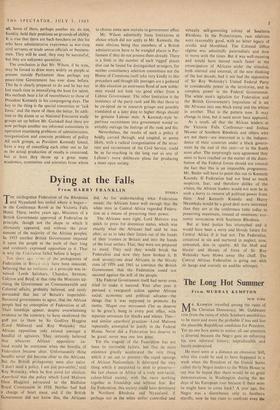Dying at the Falls
From HARRY FRANKLIN
LUSAKA
THE misbegotten Federation of the Rhodesias and Nyasaland has ended where it began— in the Conference Room at the Victoria Falls Hotel. There, twelve years ago, Ministers of a British Government approved of Federation in principle, though not the shape in which it ultimately appeared, and without the prior consent of the majority of the African peoples. In 1953 another British Government imposed it upon the people in the teeth of their long and virulently expressed opposition to it. That is why the Fed.zration failed before it began.
Ten ■, ears ago. s-me of the protagonists of Federation in Brita.n may have been innocent, believing that no violation ol a principle was in- volved. Lords Salisbury, Chandos, Swinton, Colyton and Boyd, at that time the Ministers ad- vising the Government on 'Commonwealth and Colonial affairs, probably believed, and easily persuaded that last. of Britain's imperialist- flavoured governments to agree, tha,t the African people had no conception of Federation at all. Their lordships appear, despite overwhelming evidence to the contrary, to have swallowed the guff put to them by Sir Godfrey Huggins (Lord Malvern) .and Roy Welensky that African opposition only existed amongst a handful of agitators. They certainly believed that whatever African opposition ex- isted would be overcome when the benefits of Federation became clear. Unfortunately those benefits never did become clear to the Africans. But the British protagonists were also naïve. 'I don't need .a policy. I am just pro-settler,' said Roy Welensky, when 'he first stood for election. Apartheid was the policy which Lord Malvern (then Huggins) advocated to the Bledisloe Royal Commission in 1938. Neither had had a change of heart since, and if the British Government did not know this, the Africans did. As for understanding what Federation meant, the Africans knew well enough that the white men in Central Africa regarded Federa- tion as a means of preserving their power.
The Africans were right. Lord Malvern was quick to press for dominion status, which was exactly what the Africans had said he was after, so as to take their future out of the hands of their trustees in Britain and into the hands of the local settlers. That, they were not prepared to stand.. They said they would break the Federation and now they have broken it. It took seventy-one dead Africans in the blbody riots of' 1959 and 1961 to convince the British Government that the Federation could not succeed against the will of the people.
The Federal Government itself had never even tried to make it succeed. Year after year it pursued a rearguard action against African social, economic and political advance—the things that it was supposed to promote. Its motto, 'Magni esse mereamitr ('let us deserve to be great'), hung in every post oflice, with separate entrances for blacks and whites. This— and similar apartheid practices—Lord Malvern repeatedly attempted to justify in the Federal House. Never did a Federation less deserve to be great; never was one less great.
Yet the tragedy of the Federation has not been its inevitable failure, but that its mere existence greatly accelerated the very thing which it set out to prevent—the rapid upsurge of African Nationalism. It destroyed the very thing which it purported to wish to preserve— the last chance in Africa of a truly non-racial, colour-blind society, with the races working together in friendship and without fear. But for Federation, this society could have developed in Northern Rhodesia and Nyasaland, if perhaps not in the white settler controlled and virtually self-governing colony of Southern Rhodesia. In the Protectorates, race relations were reasonably good, with no bitter legacy of revolts and bloodshed. The Colonial Office regime was admittedly paternalistic and slow to move with the times. But it was well-meaning and would have moved much faster in the emancipation of Africans under the stimulu§, both internal and external, of the new thinking of the last decade, had it not had the opposition of Sir Roy Welensky's United Federal Party in considerable power in the territories, and in complete power in the Federal Government. The white men's agitation for Federation and the British Government's imposition of it set the Africans into one black camp and the whites in another. That is the pattern now. It may change in time, but it need never have appeared.
As a result, all that the African leaders at the Victoria Falls Conference—and Joshua Nkomo of Southern Rhodesia and others who are not there—are interested in is the indepen- dence of their countries under a black govern- ment by the end of this year—or in the South soon after. The surprisingly easy agreement they seem to have reached on the matter of the distri- bution of the Federal forces should not conceal the fact that this is an impossible programme. Mr. Butler will have to point this out to Kenneth Kaunda. If Federation .had not bred so much suspicion, fear, and therefore dislike of the whites, the African leaders would not now be in such a hurry to remove all political power from them. And Kenneth Kaunda and Harry Nkumbula would be a good deal more interested than they are at the conference table today in preserving maximum, instead of minimum, eco- nomic association with Southern Rhodesia.
But at least justice has triumphed and it would have been a sorry and bloody future for Central Africa if it had not. The Federation, conceived in sin and nurtured in neglect, now, unwanted, dies in apathy. All the bluff and bluster and threats of force of Sir Roy Wetensky have blown away like chaff. The Central African Federation is going out with nil bangs and scarcely an audible whimper.






































 Previous page
Previous page